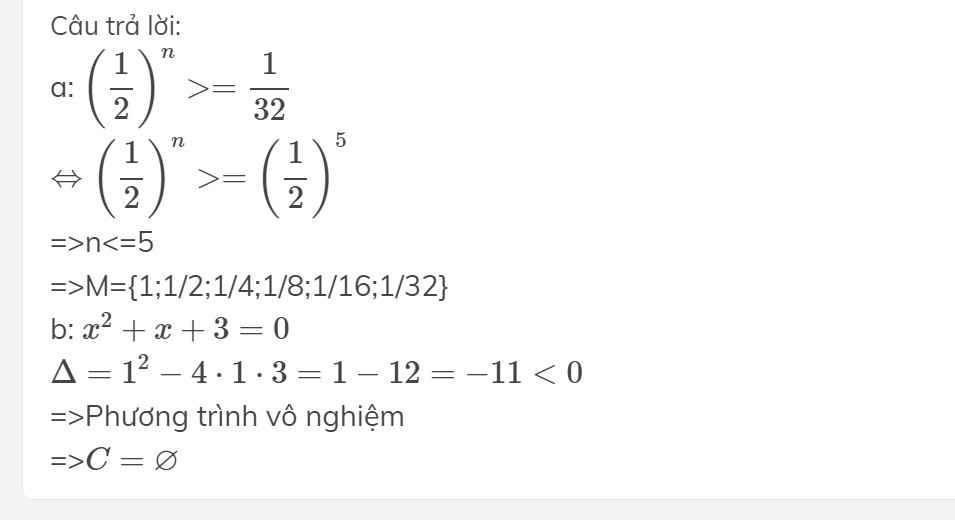

Hãy nhập câu hỏi của bạn vào đây, nếu là tài khoản VIP, bạn sẽ được ưu tiên trả lời.



a: \(\left(\dfrac{1}{2}\right)^n>=\dfrac{1}{32}\)
\(\Leftrightarrow\left(\dfrac{1}{2}\right)^n>=\left(\dfrac{1}{2}\right)^5\)
=>n<=5
=>M={1;1/2;1/4;1/8;1/16;1/32}
b: \(x^2+x+3=0\)
\(\text{Δ}=1^2-4\cdot1\cdot3=1-12=-11< 0\)
=>Phương trình vô nghiệm
=>\(C=\varnothing\)

Bạn ghi lại đề đi bạn. Với lại cho mình hỏi là đề bài yêu cầu gì vậy?


\(a,C=\left\{0;5;10;15;20;25;30\right\}\\ b,x^2+3x-4=0\\ \Leftrightarrow x^2-x+4x-4=0\\ \Leftrightarrow x\left(x-1\right)+4\left(x-1\right)=0\\ \Leftrightarrow\left(x-1\right)\left(x+4\right)=0\\ \Leftrightarrow x-1=0.hoặc.x+4=0\\ \Leftrightarrow x=1.hoặc.x=-4\\ Vậy:D=\left\{-4;1\right\}\)

\(c,20=2^2\cdot5\\ 45=3^2\cdot5\\ ƯCLN\left(20,45\right)=5\\ \RightarrowƯC\left(20,45\right)=Ư\left(5\right)=\left\{-5;-1;1;5\right\}\\ C=Ư\left(5\right)=\left\{-5;-1;1;5\right\}\)
\(d,\left(6x^2-7x+1\right)\left(x^3-x\right)=0\\ \Leftrightarrow\left(x-1\right)\left(6x-1\right)x\left(x-1\right)\left(x+1\right)=0\\ \Leftrightarrow\left\{{}\begin{matrix}x=0\\x=\dfrac{1}{6}\\x=1\\x=-1\end{matrix}\right.\)
\(\Leftrightarrow D=\left\{-1;0;\dfrac{1}{6};1\right\}\)
Sửa: \(\left[{}\begin{matrix}x=0\\x=\dfrac{1}{6}\\x=1\\x=-1\end{matrix}\right.\Leftrightarrow D=\left\{-1;0;\dfrac{1}{6};1\right\}\)

a) \(A = \{ - 2; - 1;0;1;2\} \)
\(B = \{ - 3; - 2; - 1;0;1;2;3\} \)
b) Mỗi phần tử của tập hợp A đều thuộc tập hợp B.